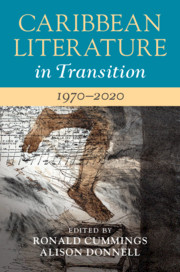Book contents
- Caribbean Literature in Transition, 1970–2020
- Caribbean Literature in Transition
- Caribbean Literature in Transition, 1970–2020
- Copyright page
- Contents
- List of Illustrations
- Contributors
- Acknowledgements
- Introduction: Caribbean Assemblages, 1970s–2020
- Part I Literary and Generic Transitions
- Part II Cultural and Political Transitions
- Part III The Caribbean Region in Transition
- Chapter 15 The Caribbean and Britain
- Chapter 16 Acts of Trespass and Collapsing Borders: Alternate Landscapes in Contemporary Caribbean-Canadian Literature
- Chapter 17 The Caribbean and the United States
- Chapter 18 The Caribbean and the Tourist Gaze
- Chapter 19 Caribbean Subjects in the World
- Part IV Critical Transitions
- Bibliography
- Index
Chapter 16 - Acts of Trespass and Collapsing Borders: Alternate Landscapes in Contemporary Caribbean-Canadian Literature
from Part III - The Caribbean Region in Transition
Published online by Cambridge University Press: 16 December 2020
- Caribbean Literature in Transition, 1970–2020
- Caribbean Literature in Transition
- Caribbean Literature in Transition, 1970–2020
- Copyright page
- Contents
- List of Illustrations
- Contributors
- Acknowledgements
- Introduction: Caribbean Assemblages, 1970s–2020
- Part I Literary and Generic Transitions
- Part II Cultural and Political Transitions
- Part III The Caribbean Region in Transition
- Chapter 15 The Caribbean and Britain
- Chapter 16 Acts of Trespass and Collapsing Borders: Alternate Landscapes in Contemporary Caribbean-Canadian Literature
- Chapter 17 The Caribbean and the United States
- Chapter 18 The Caribbean and the Tourist Gaze
- Chapter 19 Caribbean Subjects in the World
- Part IV Critical Transitions
- Bibliography
- Index
Summary
From the 1960s, significant numbers of Caribbean writers migrated to Canada, which modelled itself as a space of inclusion and multiculturalism. Yet, the terms of multiculturalism that structure Canadian public discourse have been challenged by first- and second-generation Caribbean writers who have critiqued Canada’s processes of homogenization and racism. This essay proposes alternate landscapes as a way to consider contemporary Caribbean-Canadian literature, which has had to transgress Canada’s sense of itself in order to be seen and heard. The work emerging from this period, and particularly from the 1980s, is written predominantly by women and posits non-territorially based spaces as its conceptual home. Through an examination of work by Dionne Brand, Makeda Silvera, NourbeSe Philip, Marie-Célie Agnant and Ramabai Espinet, among others, this article highlights their varied approaches to identity, nation, belonging and language, as well as the generic diversity of their work (dub poetry, science fiction, fantasy and satire).
Keywords
- Type
- Chapter
- Information
- Caribbean Literature in Transition, 1970–2020 , pp. 269 - 283Publisher: Cambridge University PressPrint publication year: 2021

